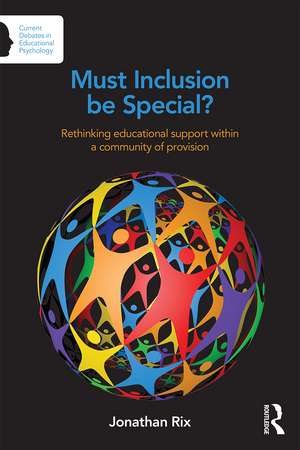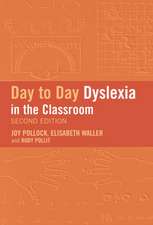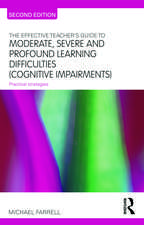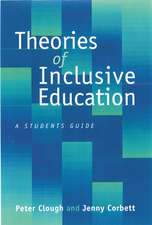Must Inclusion be Special?: Rethinking educational support within a community of provision: Current Debates in Educational Psychology
Autor Jonathan Rixen Limba Engleză Paperback – 12 iun 2015
The author examines the political, medical and cultural tendency of current times to focus upon the individual and contrasts this with the necessity to focus on context. This book distinguishes the theoretical perspectives that are often associated with special or inclusive education and the broad range of interests which depend upon their ongoing development. This examination leads to a problematisation of mainstream education provision, our understanding of why social inequities emerge and how additional support can overcome these inequities.
Further chapters explore the underlying challenges which emerge from our use and understanding of the notions of special and inclusive, outlining an alternative approach based upon a community of provision. This approach recognises the interconnectedness of services and the significance of context, and it encapsulates the aspiration of much international legislation for participation and inclusion for all. But it also assumes that we tend towards diffuse practices, services, policies, settings and roles, spread across provision which is variously inclusive and exclusionary. In seeking to create equitable participation for all, support needs to shift its focus from the individual to this diffuse network of contexts.
Must Inclusion be Special? emerges from the research base which problematises inclusion and special education, drawing upon examples from many countries. It also refers to the author’s research into pedagogy, language and policy, and his experiences as a teacher and the parent of a child identified with special educational needs.
| Toate formatele și edițiile | Preț | Express |
|---|---|---|
| Paperback (1) | 350.85 lei 6-8 săpt. | |
| Taylor & Francis – 12 iun 2015 | 350.85 lei 6-8 săpt. | |
| Hardback (1) | 1218.08 lei 6-8 săpt. | |
| Taylor & Francis – 15 iun 2015 | 1218.08 lei 6-8 săpt. |
Preț: 350.85 lei
Nou
Puncte Express: 526
Preț estimativ în valută:
67.14€ • 70.27$ • 55.88£
67.14€ • 70.27$ • 55.88£
Carte tipărită la comandă
Livrare economică 31 martie-14 aprilie
Preluare comenzi: 021 569.72.76
Specificații
ISBN-13: 9780415710992
ISBN-10: 0415710995
Pagini: 228
Ilustrații: 14 black & white tables, 1 black & white halftones, 19 black & white line drawings
Dimensiuni: 156 x 234 x 12 mm
Greutate: 0.33 kg
Ediția:1
Editura: Taylor & Francis
Colecția Routledge
Seria Current Debates in Educational Psychology
Locul publicării:Oxford, United Kingdom
ISBN-10: 0415710995
Pagini: 228
Ilustrații: 14 black & white tables, 1 black & white halftones, 19 black & white line drawings
Dimensiuni: 156 x 234 x 12 mm
Greutate: 0.33 kg
Ediția:1
Editura: Taylor & Francis
Colecția Routledge
Seria Current Debates in Educational Psychology
Locul publicării:Oxford, United Kingdom
Public țintă
Postgraduate and UndergraduateCuprins
Part 1: 1. Inclusive and special 2. Why do we need special and inclusive education? 3. The structures and processes of inclusion 4. Thinking and talking about special and inclusive Part 2: 5. Our focus upon the individual and the context 6. Confronting the mainstream challenge 7. Challenging the contadictions within a community of provision
Descriere
Must Inclusion be Special? examines the discord between special education and inclusive education and why this discord can only be resolved when wider inequalities within mainstream education are confronted. It calls for a shift in our approach to provision, from seeing it as a conglomeration of individualised needs to recognising it to be a conglomeration of collective needs.
The author examines the political, medical and cultural tendency of current times to focus upon the individual and contrasts this with the need to focus on context. The theoretical perspectives often associated with either special or inclusive education and the broad range of interests which depend upon their ongoing development are identified and analysed. This examination leads to a problematisation of mainstream education provision and our understanding of why social inequities emerge and how additional support can overcome these inequities.
The author examines the political, medical and cultural tendency of current times to focus upon the individual and contrasts this with the need to focus on context. The theoretical perspectives often associated with either special or inclusive education and the broad range of interests which depend upon their ongoing development are identified and analysed. This examination leads to a problematisation of mainstream education provision and our understanding of why social inequities emerge and how additional support can overcome these inequities.

















